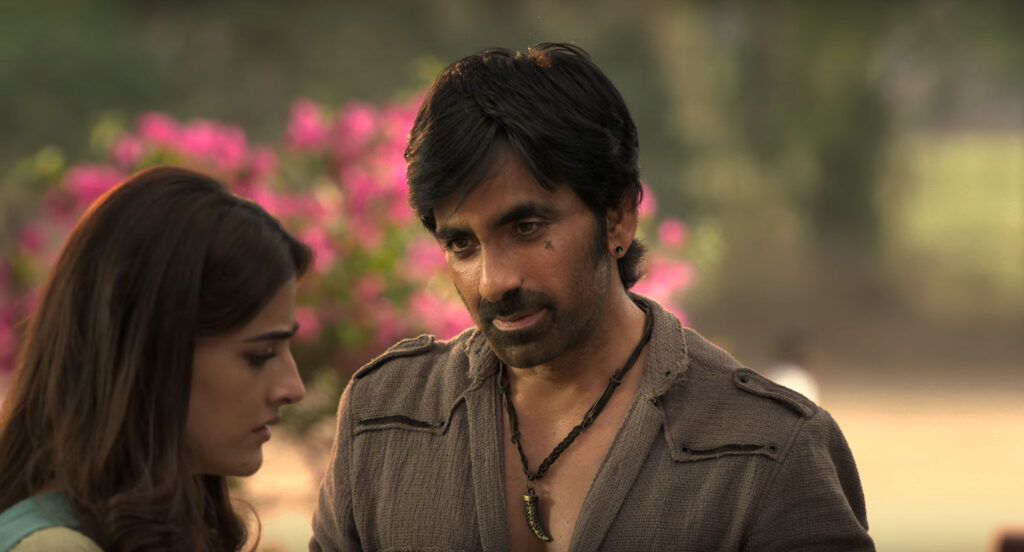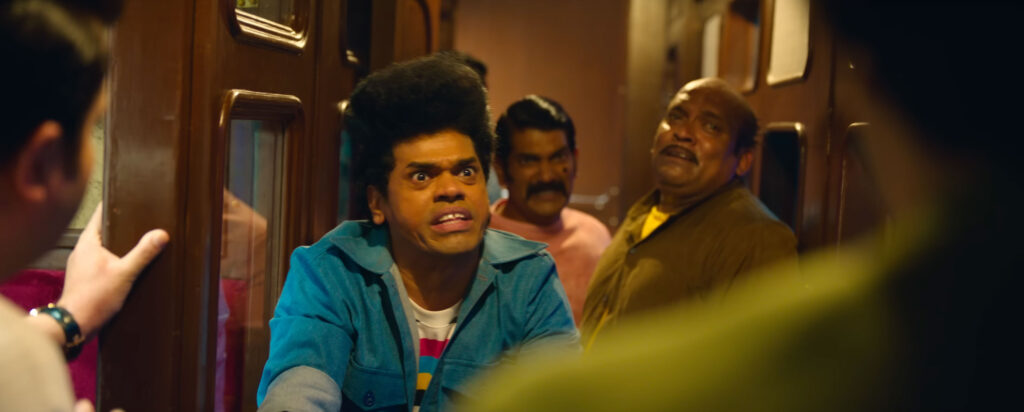October 28, 2023
by Carla Hay

Directed by Vamsee
Telugu with some language in Tamil, Hindi, Kannada and Malayalam with subtitles
Culture Representation: Taking place in India, primarily in the 1970s, with some scenes in 1980 and the 1950s, the action film “Tiger Nageswara Rao” (loosely based on the real life of notorious thief Nageswara Rao) features an all-Indian cast of characters representing the working-class, middle-class and wealthy.
Culture Clash: A Robin Hood-like thief, who robs from the rich so he can give to the poor, tries to avoid being captured by law enforcement.
Culture Audience: “Tiger Nageswara Rao” will appeal primarily to people who are fans of the movie’s headliners, but it’s an overly long and repetitive mess of tiresome clichés.

Even though “Tiger Nageswara Rao” is loosely based on the real life of notorious thief Nageswara Rao, the movie is just a pathetic ripoff of stories about English folk hero Robin Hood, but without any charm and intrigue that define Robin Hood lore. This three-hour slog of hack filmmaking drags with empty stereotypes of action flicks about outlaws, revenge and betrayals. The movie’s rampant misogyny, bad acting and wretched story make this vile film a big turnoff. Avoid this bloated trash.
Directed by Vamsee (who co-wrote the horrendous “Tiger Nageswara Rao” screenplay with Srikanth Vissa), “Tiger Nageswara Rao” takes place in India, mostly in the 1970s. In the city of Chirala, the rehabilitation colony of Stuartpurnam exists for the Erukula tribe, which has a history of oppression from British conquerors. In the 1970s, Stuartpurnam is plagued with violent crimes. Local law enforcement is overwhelmed and can’t seem to reign in the worst criminals.
The movie begins on March 22, 1980. A code red alert has summoned deputy superintendent of police Vishwanath Sastry (played by Murali Sharma) to India’s Intelligence Bureau headquarters in New Delhi. One of the officials he meets with is an officer named Raghavendra Rajput (played by Anupam Kher), who tells Vishwanath that they are looking to take down Tiger Nageswara Rao (nicknamed Nagi), a corrupt politician who has a long history of being a thief.
Vishwanath says he knows who Nageswara is, because he had a run-ins with him in Chirala. The movie then flashes back to a train heist that was masterminded by Nageswara, sometime in the 1970s. The chase scenes (some of which take place on top of the moving train) have shoddy and very fake-looking visual effects.
The movie then further flashes back to 1956, to show Nageswara as an orphaned child at 8 years old. He became a protégé of a criminal named Gajjala Prasad (plagued by Nassar), who teaches Nageswara how to become a master thief at the age of 11. By the time he was in his 20s, Nageswara (played by Ravi Teja) was considered to be India’s biggest thief. Nageswara was also difficult to capture. Teja, who was in his mid-50s when he made “Tiger Nageswara Rao,” never looks believable as someone who is supposed to be in his 20 in this movie.
In 1971, a member of the legislative assembly named Yelamanda (played by Hareesh Peradi) supervises a auction that is held every year in Stuartpurnam. The auction, which has luxury goods, is the ideal target for a thief such as Nageswara. You can imagine what happens next. Yelamanda is one of a growing list of people who becomes an enemy of Nageswara. In addition to federal agent Rajput, there’s a local Chirala police inspector named Mouli (played by Jisshu Sengupta) who is hunting Nageswara.
Nageswara is not only greedy when it comes to money, he’s also a promiscuous lout who treats women like playthings to be used and abused. The movie shows in non-explicit ways that he thinks he’s an expert seducer of women, just because he has orgies with at least 10 women at a time. One day, while Nageswara is at an outdoor market, an attractive young woman named Sara (played by Nupur Sanon) catches his attention. It’s lust at first sight for Nageswara.
And then (get ready to cringe), this idiotic dialogue happens: Nageswara says to Sara as a pickup line: “I’m hungry.” Sara replies in a sexual double entendre, “In order to eat off my plate, one must fast for three days.”
Nageswara doesn’t like this rejection from Sara, so he hits her so hard, she falls down. A nearby police officer goes to defend Sara, but Nageswara assaults him too. The brawling that ensues consists of more phony-looking stunts. Nageswara wins the fight and walks away without getting arrested.
Nageswara isn’t done with Sara, who is engaged to be married. Nageswara shows up unannounced and uninvited at her wedding. He ruins the wedding by telling Sara that he stole her dowry money from a chest. She slaps him, but Nageswara insists that Sara will be his, as if she’s a possession, not a human being.
Sara’s fiancé backs out of the wedding when he hears the dowry has been stolen. Nageswara uses this abandonment as “proof” that the fiancé didn’t really love Sara. Nageswara also says he did Sara a favor by exposing her fiancé as a gold digger. And in this awful movie, this tactic works. Nageswara is able to romance Sara for a while.
Through a series of circumstances, Nageswara ends up marrying someone else who doesn’t excite him as much as Sara does. Her name is Mani (played by Gayatri Bhardwaj), who becomes Nageswara’s long-suffering wife. Mani knows that Nageswara doesn’t love her as much as she loves him. Nageswara and Mani have twin daughters together. (Mani gives birth in a tacky melodramatic scene.)
“Tiger Nageswara Rao” tries to depict the title character as a “noble” folk hero who wants to use the money he steals to build a factory that can provide jobs, but the movie reprehensibly excuses his abuse of women. “Tiger Nageswara Rao” is really just a violent soap opera, where Nageswara continues to steal and avoid getting captured. He’s so smug and arrogant about his crimes, there’s nothing “noble” about him.
There are some sleazy subplots thrown into the movie, such as Sara being forced into prostitution. It’s just more of this film’s woman-hating attitude on display. No one in the movie’s cast gives a good performance. They all look like they’re on auto-pilot for their characters, who have one-dimensional personalities.
There’s so much unimaginative repetition in “Tiger Nageswara Rao” (robberies, unrealistic fight scenes, Nageswara getting away), it’s truly mind-numbing and boring to watch after a while. It’s also a movie that has musical numbers that don’t fit the film’s overall tone. “Tiger Nageswara Rao” also has an obnoxiously loud music score, which seems to be a characteristic of horrendous action flicks that mistakenly think “loud music score” equals “effective music score.” There is absolutely nothing in “Tiger Nageswara” that is truly original and worth seeing, which is another way of saying that people who value their time shouldn’t see this movie at all.
Abhishek Agarwal Arts released “Tiger Nageswara Rao” in select U.S. cinemas and in India on October 20, 2023.








